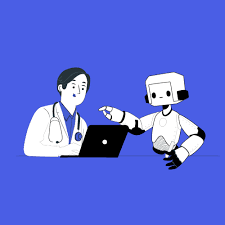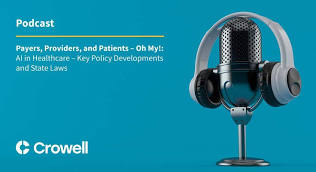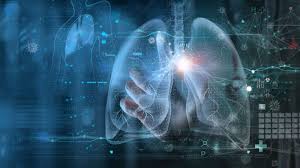Artificial Intelligence in Healthcare: Transforming the Future of Medicine
Artificial intelligence (AI) is revolutionizing various industries, and healthcare is no exception. With its ability to analyze vast amounts of data quickly and accurately, AI holds the promise of transforming how healthcare is delivered, improving patient outcomes, and reducing costs.
Enhancing Diagnostics
One of the most significant impacts of AI in healthcare is its potential to enhance diagnostic accuracy. Machine learning algorithms can process medical images such as X-rays, MRIs, and CT scans with remarkable precision. These algorithms are trained on thousands of images to identify patterns that may be imperceptible to the human eye.
For instance, AI systems have demonstrated proficiency in detecting early signs of diseases like cancer and diabetic retinopathy. By providing doctors with a second opinion or flagging potential issues for further examination, AI can lead to earlier detection and treatment.
Personalized Medicine
AI also plays a crucial role in personalized medicine by analyzing genetic information to tailor treatments for individual patients. By understanding a patient’s genetic makeup, AI can help predict how they will respond to certain medications or identify potential side effects.
This approach not only enhances treatment efficacy but also minimizes adverse reactions, leading to better patient outcomes. Personalized medicine powered by AI is paving the way for more targeted therapies that cater specifically to each patient’s unique needs.
Streamlining Administrative Tasks
The administrative burden in healthcare settings often takes valuable time away from patient care. AI can automate routine tasks such as scheduling appointments, managing medical records, and processing insurance claims.
This automation allows healthcare professionals to focus more on direct patient care rather than paperwork. Additionally, it reduces errors associated with manual data entry and improves overall operational efficiency within healthcare facilities.
Improving Patient Monitoring
AI-powered wearable devices are becoming increasingly popular for continuous patient monitoring. These devices collect real-time data on vital signs such as heart rate, blood pressure, and glucose levels.
The collected data is analyzed by AI algorithms that can detect anomalies or trends indicating potential health issues. This proactive approach enables timely interventions before conditions worsen, ultimately improving patient outcomes and reducing hospital readmissions.
The Challenges Ahead
Despite its promising potential, the integration of AI in healthcare does come with challenges. Concerns about data privacy and security must be addressed to ensure patient information remains confidential. Additionally, there is a need for standardized regulations governing the use of AI technologies in clinical settings.
Furthermore, while AI can assist healthcare professionals significantly, it cannot replace human empathy or judgment entirely. Ensuring that these technologies complement rather than replace human expertise will be crucial moving forward.
The Road Ahead
The future of artificial intelligence in healthcare looks promising as advancements continue at an unprecedented pace. With ongoing research and collaboration between tech companies and medical institutions worldwide; we are likely to witness even more groundbreaking innovations soon.
If harnessed effectively; artificial intelligence has immense potential not only for improving diagnosis accuracy but also enhancing treatment outcomes while streamlining operations within hospitals globally – ultimately leading us towards a healthier future where everyone receives optimal care tailored specifically for them!
Exploring the Role and Future of Artificial Intelligence in Healthcare: Key Questions and Insights
- What is the future of AI in healthcare?
- What is the future of artificial intelligence in healthcare?
- How is AI being used in healthcare?
- What is an example of AI in health?
- How is artificial intelligence currently used in healthcare?
- What are the pros and cons of AI in healthcare?
- How is AI used in healthcare 2023?
What is the future of AI in healthcare?
The future of AI in healthcare is poised to be transformative, with the potential to revolutionize patient care, diagnostics, and treatment methodologies. As AI technologies continue to advance, they are expected to become more integrated into everyday healthcare practices, making processes more efficient and personalized. AI could enable precision medicine by analyzing genetic information and predicting patient responses to treatments, thus tailoring therapies to individual needs. Moreover, AI-driven tools are likely to enhance diagnostic accuracy through advanced imaging analysis and pattern recognition. In administrative areas, AI can streamline operations by automating routine tasks such as scheduling and data management. However, the successful integration of AI into healthcare will require addressing challenges related to data privacy, ethical considerations, and ensuring that these technologies complement rather than replace human expertise. As these issues are navigated, the future of AI in healthcare holds promise for improved outcomes and a more patient-centered approach.
What is the future of artificial intelligence in healthcare?
The future of artificial intelligence in healthcare is poised to be transformative, offering unprecedented advancements in patient care, diagnostics, and operational efficiency. As AI technologies continue to evolve, they are expected to play an increasingly integral role in personalized medicine, enabling treatments tailored to individual genetic profiles and health histories. AI’s ability to analyze large datasets quickly will enhance predictive analytics, allowing for earlier detection of diseases and more effective intervention strategies. Additionally, AI will streamline administrative processes, reducing the burden on healthcare professionals and allowing them to focus more on patient interaction. Despite challenges such as data privacy concerns and the need for regulatory frameworks, the continued integration of AI into healthcare promises a future where medical care is more precise, efficient, and accessible.
How is AI being used in healthcare?
AI is being utilized in healthcare to enhance various aspects of patient care and operational efficiency. One of the primary applications is in diagnostics, where machine learning algorithms analyze medical images to identify diseases such as cancer and cardiovascular conditions with high accuracy. AI also plays a crucial role in personalized medicine by analyzing patient data to tailor treatments based on individual genetic profiles, thereby improving treatment efficacy and reducing adverse effects. Additionally, AI-powered systems streamline administrative tasks like scheduling and record management, allowing healthcare professionals to focus more on direct patient care. Furthermore, AI-driven wearable devices continuously monitor patients’ vital signs, providing real-time data that can predict health issues before they become critical. Overall, AI is transforming healthcare by making it more efficient, accurate, and personalized.
What is an example of AI in health?
One prominent example of artificial intelligence in healthcare is the use of AI-powered algorithms in medical imaging. These algorithms are designed to analyze images from X-rays, MRIs, and CT scans with remarkable precision and speed. For instance, AI systems can assist radiologists by identifying early signs of diseases such as cancer or detecting abnormalities like tumors that might be missed by the human eye. This technology not only aids in improving diagnostic accuracy but also allows for earlier intervention and treatment planning, ultimately enhancing patient outcomes. By providing a reliable second opinion and reducing the workload on healthcare professionals, AI in medical imaging exemplifies how technology can significantly advance the field of healthcare.
How is artificial intelligence currently used in healthcare?
Artificial intelligence is currently utilized in healthcare in a variety of impactful ways. AI technologies are employed to enhance diagnostic accuracy by analyzing medical images such as X-rays, MRIs, and CT scans, often identifying patterns that may be missed by the human eye. This assists in the early detection of diseases like cancer and cardiovascular conditions. AI also plays a crucial role in personalized medicine by analyzing genetic data to tailor treatments to individual patients, improving efficacy and reducing adverse effects. Additionally, AI streamlines administrative tasks such as scheduling and record-keeping, allowing healthcare professionals to focus more on patient care. Wearable devices powered by AI provide continuous monitoring of vital signs, enabling proactive management of chronic conditions. These applications demonstrate how AI is transforming healthcare delivery and patient outcomes today.
What are the pros and cons of AI in healthcare?
Artificial intelligence in healthcare offers numerous advantages but also presents certain challenges. On the positive side, AI enhances diagnostic accuracy by quickly analyzing medical data, such as imaging and genetic information, leading to earlier detection of diseases and more personalized treatment plans. It streamlines administrative tasks like scheduling and record management, allowing healthcare professionals to focus more on patient care. Additionally, AI-powered devices enable continuous patient monitoring, providing real-time insights and facilitating timely interventions. However, there are also drawbacks to consider. Concerns about data privacy and security are paramount, as sensitive patient information must be protected from breaches. The integration of AI requires significant investment in technology infrastructure and training for healthcare staff. Moreover, while AI can assist in decision-making, it cannot replace the empathy and nuanced judgment that human healthcare providers offer. Balancing these pros and cons is crucial for effectively integrating AI into healthcare systems.
How is AI used in healthcare 2023?
In 2023, artificial intelligence is increasingly integrated into healthcare, enhancing various aspects of patient care and medical operations. AI is utilized for predictive analytics, where machine learning algorithms analyze large datasets to forecast patient outcomes and disease progression. This allows for more proactive and personalized treatment plans. Additionally, AI-driven diagnostic tools are improving accuracy in detecting conditions such as cancers and cardiovascular diseases by analyzing medical images with precision that rivals or surpasses human capabilities. Virtual health assistants powered by AI are assisting patients with medication management and appointment scheduling, thus improving accessibility and efficiency within healthcare systems. Furthermore, AI is streamlining administrative tasks by automating processes like billing and record-keeping, allowing healthcare professionals to focus more on direct patient care. As AI technology continues to evolve, its role in healthcare expands, promising improved outcomes and operational efficiencies.



